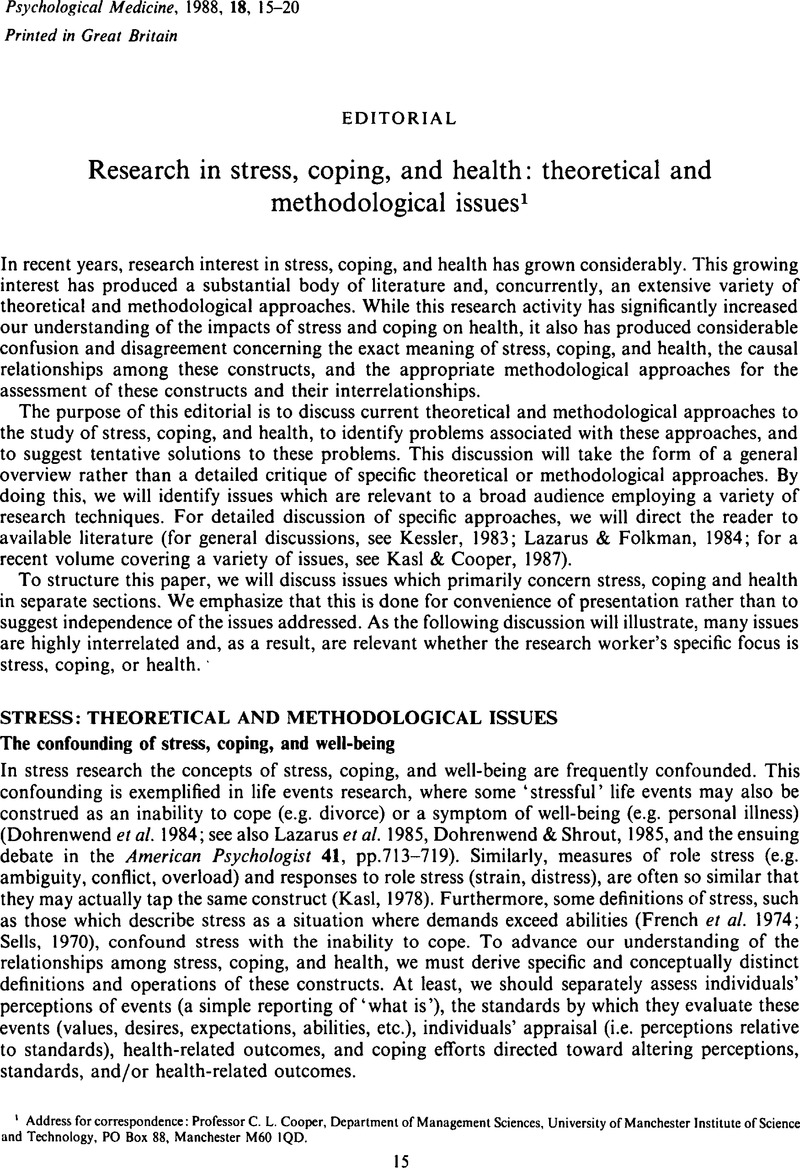Crossref Citations
This article has been cited by the following publications. This list is generated based on data provided by Crossref.
Edwards, Jeffrey R.
and
Cooper, Cary L.
1988.
The impacts of positive psychological states on physical health: A review and theoretical framework.
Social Science & Medicine,
Vol. 27,
Issue. 12,
p.
1447.
Goodyer, I. M.
1990.
Annotation: Recent Life Events and Psychiatric Disorder in School Age Children.
Journal of Child Psychology and Psychiatry,
Vol. 31,
Issue. 6,
p.
839.
Watson, Ian P. Burges
1990.
“Is violence a contagious disease?” The social implications of post-traumatic stress disorder.
Irish Journal of Psychological Medicine,
Vol. 7,
Issue. 1,
p.
47.
Vingerhoets, Ad J. J. M.
and
Van Heck, Guus L.
1990.
Gender, coping and psychosomatic symptoms.
Psychological Medicine,
Vol. 20,
Issue. 1,
p.
125.
Auslander, Gail K.
and
Litwin, Howard
1991.
Social Networks, Social Support, and Self-Ratings of Health among the Elderly.
Journal of Aging and Health,
Vol. 3,
Issue. 4,
p.
493.
Kendler, Kenneth S.
Kessler, Ronald C.
Heath, Andrew C.
Neale, Michael C.
and
Eaves, Lindon J.
1991.
Coping: a genetic epidemiological investigation.
Psychological Medicine,
Vol. 21,
Issue. 2,
p.
337.
Dixon, Penny
1991.
Vicarious Victims of a Maritime Disaster.
British Journal of Guidance & Counselling,
Vol. 19,
Issue. 1,
p.
8.
Blaney, Nancy T.
Goodkin, Karl
Morgan, Robert O.
Feaster, Dan
Millon, Carrie
Szapocznik, Jose
and
Eisdorfer, Carl
1991.
A stress-moderator model of distress in early HIV-1 infection: Concurrent analysis of life events, hardiness and social support.
Journal of Psychosomatic Research,
Vol. 35,
Issue. 2-3,
p.
297.
Bennett, Ethelle
Beaurepaire, Janet
Langeluddecke, Pauline
Kellow, John
and
Tennant, Christopher
1991.
Life stress and non-ulcer dyspepsia: A case-control study.
Journal of Psychosomatic Research,
Vol. 35,
Issue. 4-5,
p.
579.
Pritchard, M. J.
1992.
Care of the Critically Ill Patient.
p.
1029.
Charlton, B G
1992.
Stress..
Journal of Medical Ethics,
Vol. 18,
Issue. 3,
p.
156.
Norman, Ross M. G.
and
Malla, Ashok K.
1993.
Stressful Life Events and Schizophrenia II: Conceptual and Methodological Issues.
British Journal of Psychiatry,
Vol. 162,
Issue. 2,
p.
166.
Grosse, Alejo
Prchal, Abigail
Puertas, Carmen Diaz
and
Coviello, Alfredo
1993.
Effects of Psychological Stress on Cold Pressor Test Results.
Behavioral Medicine,
Vol. 19,
Issue. 1,
p.
35.
Dewe, Philip
Cox, Tom
and
Ferguson, Eamonn
1993.
Individual strategies for coping with stress at work: A review.
Work & Stress,
Vol. 7,
Issue. 1,
p.
5.
Spurrell, M. T.
and
McFarlane, A. C.
1993.
Post-traumatic stress disorder and coping after a natural disaster.
Social Psychiatry and Psychiatric Epidemiology,
Vol. 28,
Issue. 4,
p.
194.
Haw, Catherine E.
1995.
The family life cycle: a forgotten variable in the study of women's employment and well-being.
Psychological Medicine,
Vol. 25,
Issue. 4,
p.
727.
Lindquist, T. L.
Beilin, L. J.
and
Knuiman, M.
1995.
EFFECTS OF LIFESTYLE, COPING AND WORK‐RELATED STRESS ON BLOOD PRESSURE IN OFFICE WORKERS.
Clinical and Experimental Pharmacology and Physiology,
Vol. 22,
Issue. 8,
p.
580.
BRODATY, HENRY
GRESHAM, MEREDITH
and
LUSCOMBE, GEORGINA
1997.
THE PRINCE HENRY HOSPITAL DEMENTIA CAREGIVERS? TRAINING PROGRAMME.
International Journal of Geriatric Psychiatry,
Vol. 12,
Issue. 2,
p.
183.
Kohn, Paul M.
O'Brien, Colleen
and
Pickering, Donna I.
1997.
Adaptiveness: A moderator of the adverse impact of hassles?.
Personality and Individual Differences,
Vol. 22,
Issue. 6,
p.
895.
Andersson, Sven Ingmar
and
Albertsson, Maria
2000.
Stress and situationally related coping in cancer out-patients and their spouses.
Stress Medicine,
Vol. 16,
Issue. 4,
p.
209.



